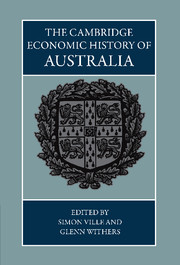Book contents
- The Cambridge Economic History of Australia
- The Cambridge Economic History of Australia
- Copyright page
- Contents
- Contributors
- List of figures
- List of maps
- List of tables
- Preface
- Abbreviations
- Introduction: connecting past, present and future
- Part 1 Framework
- 1 The historiography of Australian economic history
- 2 Australian economic growth and its drivers since European settlement
- 3 Analytical frameworks of Australia’s economic history
- Part 2 Transition
- Part 3 Economic expansion of the colonies
- Part 4 A national economy
- Part 5 Building the modern economy
- Part 6 Looking backwards and to the future
- Statistical Appendix: selected data series, 1800–2010
- References
- Subject index
- Company index
3 - Analytical frameworks of Australia’s economic history
from Part 1 - Framework
Published online by Cambridge University Press: 05 September 2014
- The Cambridge Economic History of Australia
- The Cambridge Economic History of Australia
- Copyright page
- Contents
- Contributors
- List of figures
- List of maps
- List of tables
- Preface
- Abbreviations
- Introduction: connecting past, present and future
- Part 1 Framework
- 1 The historiography of Australian economic history
- 2 Australian economic growth and its drivers since European settlement
- 3 Analytical frameworks of Australia’s economic history
- Part 2 Transition
- Part 3 Economic expansion of the colonies
- Part 4 A national economy
- Part 5 Building the modern economy
- Part 6 Looking backwards and to the future
- Statistical Appendix: selected data series, 1800–2010
- References
- Subject index
- Company index
Summary
- Type
- Chapter
- Information
- The Cambridge Economic History of Australia , pp. 52 - 70Publisher: Cambridge University PressPrint publication year: 2014

